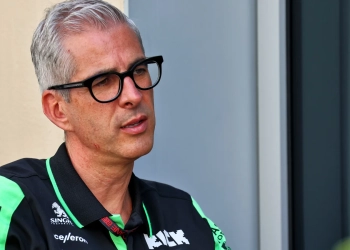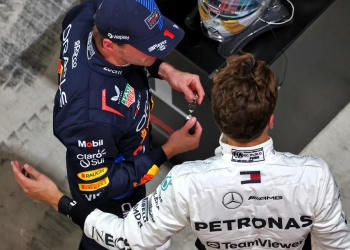Did you hear the laughter?
If not the real-life smirks, then surely the cackles and wry remarks that raced around the internet were impossible to miss.
Haas’ title partnership with the slightly mysterious drinks brand Rich Energy, and its colourful and contrarian CEO William Storey, has already raised eyebrows, and it was during the team’s launch event at the glittering Royal Automobile Club that a supposedly outlandish remark was made.
“Haas are brilliant people and they’re the perfect partner for Rich Energy as we move forward to challenge Red Bull on and off the track,” said Storey.
Red Bull is a market leader in the beverage industry – using extreme sports as a platform to promote its product – and whether Storey’s company, which includes seven shareholders, among them West Ham United co-owner David Sullivan, can trouble the Austrian giants is a matter for the business industry.
That Storey was widely ridiculed for such on-track ambition highlighted the predictable trap and competitiveness chasm into which Formula 1 has fallen under the current regulations.
Haas’ Guenther Steiner, Romain Grosjean and Kevin Magnussen were quick to admire Storey’s bravado and ambition though subtly played down such lofty expectations, given their respective experience of Formula 1’s picture.

Formula 1’s reliance on machinery and its exclusive nature means it is difficult to draw comparisons to other sports. But that the idea of the fifth-best team challenging the third-best team was mocked by observers should emphasise to Liberty Media one of the key areas it needs to address.
Mercedes, Ferrari and Red Bull have taken every Grand Prix win since the second round of 2013, a run of over 100 Grands Prix that encompasses the entirety of the hybrid era. Interloper Williams threatened on occasion, having initially profited from Mercedes' engine supremacy, but it has since horribly regressed.
Since Formula 1 moved to faster cars – with greater downforce levels – for 2017 the gap between the ‘haves’ and the ‘have nots’ (ie, those whose budgets are a paltry $100m or so) has grown, with only two podiums scored by teams outside of the top three. Such predictability is not necessarily an overwhelming negative if there is at least the outside chance of an upset. But the gap is so large that it is borderline impossible for midfield teams to provide an upset. In Mexico last year Renault led the midfield but was still two entire laps behind winner Red Bull – even with the same power unit in the back. Haas’ best result in 2018 came as a consequence of it extracting the maximum from its package, but its fourth and fifth in Austria also owed much to the exit of both Mercedes drivers and Red Bull’s Daniel Ricciardo. On a ‘normal’ Sunday it would have been seventh and eighth. Most sports are formed on a foundation of a pecking order, but there has to at least be a chance of something out of the ordinary happening (and, it should be added, without the huge reliance on mechanical failures elsewhere). Formula 1 hasn’t had a proper feel-good underdog story, outside of the Baku madness, for several years now. Several highly-competitive and skilled athletes arrive at each event knowing it’s a Grand Prix for (without retirements) seventh place, with terms such as ‘Class B’ and ‘Formula 1.5’ banded about in 2018 to the point of becoming normalised. It is not a positive situation for teams either. The likelihood of this changing across the next two years is remote.
By no means should free meal tickets be handed out to Formula 1 teams for the sake of unpredictability, but the reaction to Storey’s ambition should act as another lesson for Liberty as the deadline for any fundamental 2021 changes looms larger.







